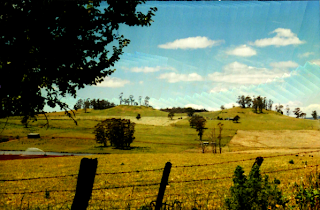FOr about 15 years, Caroline and Ephraim the Younger farmed at Paradise. I was informed that the foundations to their house were still there and with map in hand, family in tow, went off to find the historic ruins. Turn left at the Church was the instruction. We stopped to have a closer look before turning and discovered a little wooden building with an outhouse at the back, an original pit toilet and it certainly smelt like it. With handkerchiefs over our noses, we hopped back in the car and puttered on up the hill. Another left turn and we were almost there. I could feel the spirits in the air. It was a historical moment. Again, something was not quite right. Along the ground were vestiges of cement blocks, my ruins. Also marking the spot was a dead car body, a black and white cow and a broken Hills hoist; not the romantic idea I had had in my head. It was hard to believe that my ancestors had lived there under the shadow of Mount Roland, clearing the forest, fighting the elements and gaining spiritual comfort from their membership of the Christian Brethren Church. Ephraim was one of eight signatories to the deeds when a new church was built and was very involved. Caroline's brother William was also living in the district and was a member. Unfortunately, women in their position left very few records other than the endless registrations as thier many children arrived. Caroline gave birth to most of her 12 children in the district. She would have worried, along with her husband over the floods, the crops, the health of the cattle and the fires which ravaged these forest areas. Caroline was busy raising a family, keeping house and simply providing for all. On their property was another small hut, separate from their house. Here lived Ephraim's father after his release from Port Arthur. It seems that he also farmed some of the land as there are entries in his son's diary which show that he did paid work for E Doe. As he would have not paid himself, this is the most likely answer. In the mid nineties, the family decided that Paradise was not all that they wanted. Ephraim was interested in fossicking for minerals and had ventured wider. Perhaps this was the reason for their move to Wilmot where they were among the early settlers. At first they rented land but then built their own home. Ephraim still farmed and Caroline raised more children. Some of her older ones were already married and had children of their own. In 1903, Caroline was again pregnant, this time with her 13th. There are a couple of stories held by different family members. One is that she was kicked in the stomach by a cow, another that she had "kidney fits". A doctor was sent for but could do nothing. On January 6th, 1903, Caroline passed away. Her official cause of death "toxaemia". Ephraim was left on his own with his children, the youngest, not yet a year old.

 After all my excitement, a black and white cow, a car body and a hills hoist marked the spot where Ephraim and Caroline had their house. The bright line along the ground is the remains of the cement foundations. This area would have been solid timber when they first moved in and was seen as ideal farm land. It was surrounded by places named Beulah, The Promised Land and other Biblical names. There is even a place called Ephraim's Gate. Many of the local inhabitants joined the Christian Brethren and meetings were held in various homes. The forest made the district very prone to bushfires and the condition of the roads made transport very difficult. Many families moved on. This is the house where the Doe family lived. The photo was taked many years after they had left. The shingle roof had been covered with iron but just near the front of the house, a missing piece reveals the original shingles.
After all my excitement, a black and white cow, a car body and a hills hoist marked the spot where Ephraim and Caroline had their house. The bright line along the ground is the remains of the cement foundations. This area would have been solid timber when they first moved in and was seen as ideal farm land. It was surrounded by places named Beulah, The Promised Land and other Biblical names. There is even a place called Ephraim's Gate. Many of the local inhabitants joined the Christian Brethren and meetings were held in various homes. The forest made the district very prone to bushfires and the condition of the roads made transport very difficult. Many families moved on. This is the house where the Doe family lived. The photo was taked many years after they had left. The shingle roof had been covered with iron but just near the front of the house, a missing piece reveals the original shingles.
